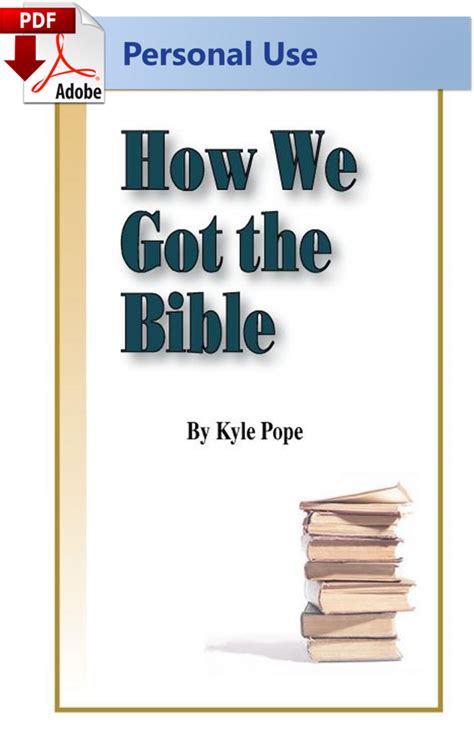How We Got The Bible Pdf
Ronan Farrow
Apr 03, 2025 · 3 min read

Table of Contents
How We Got the Bible: A Journey Through Time
The Bible, a collection of sacred texts revered by billions, didn't appear overnight. Its journey from oral traditions and scattered writings to the canonical books we know today is a fascinating and complex story. Understanding this process reveals much about the Bible's origins and its enduring impact on human history.
From Oral Tradition to Written Texts
For centuries, the stories, laws, and prophecies that would eventually form the Bible were passed down orally. These traditions were deeply embedded in the cultural fabric of ancient Israel and surrounding societies. Think of it as a living, breathing story constantly re-told and re-interpreted through generations. This oral transmission meant variations and adaptations were inevitable. The stories were shaped and molded by the experiences and beliefs of each community.
The Importance of Memory and Storytelling
In a pre-literate society, memory was paramount. Specialized individuals, often known as scribes or prophets, played a crucial role in memorizing and transmitting these stories accurately. This process involved elaborate mnemonic techniques and communal recitation, ensuring the preservation of core narratives. Storytelling, therefore, became a sacred act, solidifying the traditions within the cultural memory.
The Process of Canonization
The transition from oral tradition to written text marked a significant turning point. Over centuries, different writings emerged, some gaining wider acceptance and authority than others. The process of determining which texts would be included in the official canon was a gradual and complex one, spanning centuries and involving numerous theological and political considerations.
Criteria for Canonization
Several factors influenced which books were eventually considered canonical. These included:
- Apostolic Authority: Was the book attributed to an apostle or a close associate of Jesus?
- Conformity to Faith: Did the book align with the established beliefs and doctrines of the early Christian church?
- Widespread Acceptance: Was the book widely accepted and used by various Christian communities?
This process wasn't uniform across all Christian denominations. Different groups arrived at slightly different canons, leading to variations in the Bible's content across different traditions. The development of the New Testament canon took several centuries and was formally solidified by church councils in the 4th and 5th centuries.
The Spread and Translation of the Bible
Once the canon was largely established, the task of copying and distributing the scriptures became vital. Scribes painstakingly copied texts by hand, often creating beautiful illuminated manuscripts. The invention of the printing press in the 15th century revolutionized Bible production, making it accessible to a much wider audience. The subsequent translation of the Bible into various languages further broadened its reach, contributing to the spread of literacy and religious movements across the world.
The Impact of Translation
The translation of the Bible into different languages wasn't without its challenges. Cultural nuances, linguistic differences, and theological interpretations all played a role in shaping the meaning and understanding of the text. Various translation approaches emerged, each with its own strengths and weaknesses, highlighting the continuing effort to convey the meaning of the sacred text accurately and meaningfully across diverse contexts.
Conclusion: An Ongoing Journey
The story of how we got the Bible is a testament to the dynamic interplay between oral tradition, written text, and communal interpretation. It's a journey that continues to unfold, with scholars and theologians continually exploring the historical, literary, and theological dimensions of the Bible. Understanding this complex process allows us to appreciate the Bible's profound cultural and historical significance and engage more meaningfully with its rich and enduring narrative.
Featured Posts
Also read the following articles
| Article Title | Date |
|---|---|
| How Can I Find Out If A Motorcycle Is Stolen | Apr 03, 2025 |
| How To Turn Off Door Chime On Chevy | Apr 03, 2025 |
| 1 Gallon Of Coffee Serves How Many | Apr 03, 2025 |
| How To Vacuum Seal Strawberries | Apr 03, 2025 |
| 1189 Howe St Vancouver | Apr 03, 2025 |
Latest Posts
Thank you for visiting our website which covers about How We Got The Bible Pdf . We hope the information provided has been useful to you. Feel free to contact us if you have any questions or need further assistance. See you next time and don't miss to bookmark.
